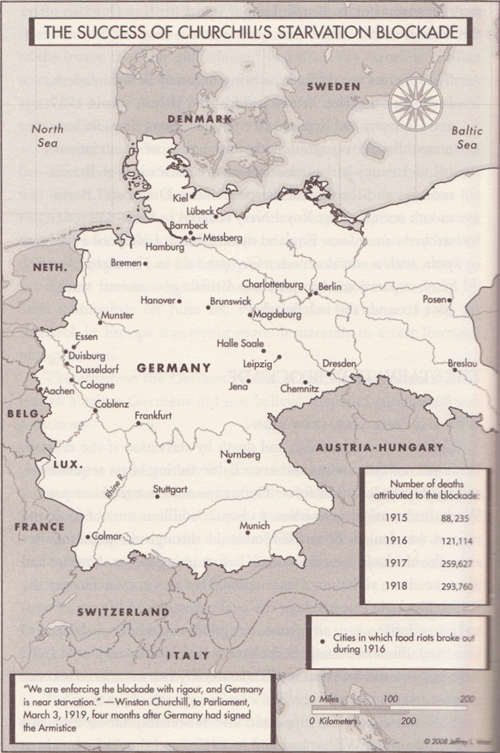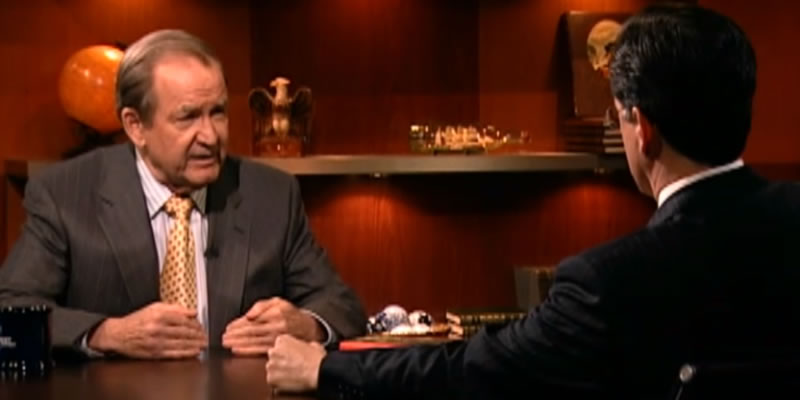While reading Patrick J. Buchanan’s new book Churchill, Hitler, and “The Unnecessary War”, I realized that a better title would have been Twisted Highlights from the World Wars that Make Churchill Look the Most Incompetent and Sadistic. While not all of Buchanan’s highlights are twisted, he tends to leave out just enough information to force the reader to draw the most negative conclusion about Churchill’s intentions.
A prime example of this manipulation at work can be seen in Buchanan’s analysis of the blockade of Germany during World War I.
- Buchanan portrays the blockade of Germany as something devised and executed entirely by Winston Churchill. The truth is that Churchill was only part of the first year of the blockade. The following 4 years, Churchill had nothing to do with the blockade.
- Buchanan portrays Churchill as celebrating the starvation of the German people after the 1918 armistice as a success of “his” blockade. In reality, Churchill was imploring the House of Commons to bring an end to the blockade as soon as possible.
Churchill’s “Starvation Blockade”
In chapter 3 of Churchill, Hitler, and the “Unnecessary War”, the creation and signing of the Treaty of Versailles is covered. The chapter is appropriately named “A Poisonous Spirit of Revenge” as the treaty did leave a bitter taste in the mouths of Germans.
As with most of the book, Buchanan attempts to associate all negative events to Churchill. Since Churchill had nothing to do with the contents or signing of Versailles, Buchanan discusses the reason why Germany would agree to such harsh terms in order to bring up Churchill’s name. Germany agreed to an armistice and eventually signed the treaty because the country was starving to death through a blockade of the North Sea.
Here’s Buchanan’s analysis.
The blockade was responsible for the deaths of thousands of men, women, and children after the Germans laid down their weapons and surrendered their warships. Its architect and chief advocate had been the First Lord of Admiralty. His aim, said Churchill, was to “starve the whole population – men, women, and children, old and young, wounded and sound – into submission.” On March 3, 1919, four months after Germany accepted an armistice and laid down her arms, Churchill rose exultant in the Commons to declare, “We are enforcing the blockade with rigour, and Germany is very near starvation.” (Buchanan, p. 79)
To drive home his point that Churchill starved people to death, Buchanan includes a map titled “THE SUCCESS OF CHURCHILL’S STARVATION BLOCKADE.” (Buchanan, p. 78).

Correcting Buchanan’s Analysis
Buchanan is correct on several things. Yes, Churchill was the First Lord of Admiralty in 1914 and implemented a blockade as soon as the war started. The Germans eventually signed the Treaty of Versailles on June 18, 1919, because they needed to eat. He is also correct that the Germans were dying by the thousands. Martin Gilbert provides an estimate of 762,106 total civilian deaths resulting from the blockade (Gilbert 1994, p. 256). R. J. Rummel provides what he identifies as a high estimate of 1,000,000 civilian deaths (Rummel, p. 230).
However, the rest of the statement and the title of the map are completely inaccurate.
The first thing people should realize is that Churchill resigned as the First Lord of Admiralty on May 16, 1915 (Gilbert 1991, p. 320) less than a year after the war started. Churchill’s advocacy and execution of the blockade stopped then and there. Through the rest of the war, Churchill found himself holding several different offices for the government and even spending several months in the trenches of France fighting the Germans.
On January 9, 1919, Churchill accepted the offices of Secretary of State for War and Secretary of State for Air in charge of the army and air force (Gilbert 1991, p. 405). Churchill’s primary task when he accepted these jobs was the demobilization of the British forces. There were 3.5 million British troops of which only a third would be needed for occupation purposes (Manchester, p. 671). Churchill was to sort through determining who went home and when, as well as who stayed at their current post or was transferred elsewhere. All of this was to be done while there was nothing more than an armistice in place between the Allies and the Central Powers.
Since May of 1915, nearly 4 years after Churchill was no longer a part of the British Navy, Churchill had zero authority on executing a blockade on Germany.
Buchanan paints an extraordinary picture of Churchill almost rejoicing at Germany’s starvation when he states “..four months after Germany accepted an armistice and laid down her arms, Churchill rose exultant in the Comment to declare…” (Buchanan, p. 79)
This is far from the real scene in the House of Commons. Churchill was delivering one of many reports about army estimates and the progress of demobilization (James, pp. 2674-2692). The lengthy report was followed-up by a Q&A session containing several references to the unknowns in the current situation. While there had been an armistice in place since November 11, 1918, it was nearly 4 months later and there was still no official treaty signed. Germany had no foreign troops on her soil; the armies had simply cease-fired.
At one point in the report, Churchill argued for never reaching the “slender scale of 1914” in terms of military power.
We do not know what other Powers are going to do, or what will be the military system in force in France, the United States, Italy, or Japan. Nobody knows what is going to happen to Germany, Austria, or Russia, or how long the world will be kept in a state of great disorder and anxiety. On every ground, therefore, it will be better to defer the final decision upon our Army system until after the War – until some, at least, of the cardinal facts on which everything turns are more clearly apparent than they are just now. (James, p. 2681)
This line of thinking is common throughout this report and others given by Churchill at the time. At this point in history with nothing more than a cease-fire in place and with Lenin rising to power in Russia, there was great concern expressed by Churchill about making sure that Great Britain’s military power was not downsized too quickly.
The two sentences delivered on March 3, 1919 that Buchanan claims were delivered exultantly, are near the end of the report before the Q&A session. After a lengthy presentation on the current status of demobilization, Churchill took a moment to address the blockade.
There is another matter which calls for very prompt settlement. It is the last to which I shall refer before I sit down. I mean the speedy enforcing of the Peace Terms upon Germany. At the present moment we are bringing everything to a head with Germany. We are holding all our means of coercion in full operation, or in immediate readiness for use. We are enforcing the blockade with rigour. We have strong Armies ready to advance at the shortest notice. Germany is very near starvation. The evidence I have received from officers sent by the War Office all over Germany shows, first of all, the great privations which the German people are suffering, and secondly, the danger of collapse of the entire structure of German social and national life under the pressure of hunger and malnutrition.
Now is, therefore, the moment to settle. To delay indefinitely would be to run a grave risk of having nobody with whom to settle, and of having another great area of the world sink into Boshevik anarchy. That would be a very grave event. I dare say honorable.
Members recall the sinking of the “Titanic.” The state of Europe seems to me to have many points of sinister comparison with that event. That great vessel had compartment after compartment invaded by the sea. She remained almost motionless upon the water as each new bulkhead filled, or as each new compartment was flooded. She gradually took a more pronounced list.
Finally, when the decisive compartments which regulated the flotation in the ocean, leaving all those on board, friend or foe, rich or poor, passengers or stokers, people of both sexes and of every age, swimming in the icy waters of the sea, with no help in sight, and no prospect of succour.
We must never forget that the ship of Europe carries with it all the glories and advantages which we have gained by the prodigies achieved by our soldiers in this war, and it is, therefore, very important to us to bring it safely to land, so that its previous injuries may be repaired.
Now is the time for action. Once Germany has accepted the terms to be imposed upon her – and until that moment all our forces must be held in the strongest condition of readiness – the revictualling of that country and the supplying of it with the necessary raw material can be begun and pushed forward with energy.
It is repugnant to the British nation to use this weapon of starvation – which falls mainly upon the women and children, upon the old, the weak, and the poor, after all the fighting has stopped – one moment longer than is necessary to secure the just terms for which we have fought. (James, p. 2684)
What Buchanan has attempted to do is paint Churchill as an incompassionate monster who was excited about starving men, women, and children to death. In reality, he was appalled by the starvation and wanted to see it ended as quickly as possible.
Buchanan’s Sources
As with most of Buchanan’s sources, he is relying purely on the analysis of those before him. Instead of presenting his own conclusions based off of reading original sources, he regurgitates statements and perspectives of those who also looked to present Churchill in a negative light.
Future articles will examine these sources and attempt to get to the root of some of these misconceptions that Buchanan presents in his book.
References
Buchanan, Patrick J. Churchill, Hitler, and “The Unnecessary War”. New York: Crown Publishing Group, 2008.
Gilbert, Martin. Churchill: A Life. New York: Henry Holt and Company, 1991.
——. The First World War: A Complete History. New York: Henry Holt and Company, 1994.
James, Robert Rhodes, ed. Winston S. Churchill: His Complete Speeches, 1897-1963. Vol. 3, 1914-1922. New York: Chelsea House Publishers, 1974.
Manchester, William. The Last Lion: Winston Spencer Churchill, Visions of Glory, 1874-1932. New York: Little, Brown, and Company, 1983.
Rummel, Rudolph J. Statistics of Democide: Genocide and Mass Murder since 1900. New Brunswick: Transaction Publishers, 1997.

